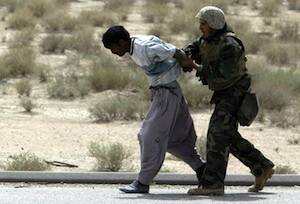Television police dramas are crowded with scenes in which the hardened detective pushes a suspect up against an alley wall and intones, “You have the right to remain silent....” This is the familiar language of the so-called Miranda warning, used to ensure that people arrested in the United States have at least a minimal understanding of their rights when they are facing criminal prosecution, above all the right to “clam up” and “lawyer up.” The warning obviously helps protect the rights of the suspect, but, worth remembering, it also clears the path for police to use at trial any incriminating information they gather during interrogation.
Since its first use after the U.S. Supreme Court decision in the case Miranda v. Arizona in 1966, the warning represents the first line of a criminal suspect’s defense even as it stands as the last line of protection for U.S. civil liberties. The era of the police procedural drama on television helped familiarize the entire nation with Miranda and what it meant.
Now a different kind of television drama is contributing to efforts to water it down. This one tantalizes with easy resolutions of terrorist threats at the hands of brutal if effective operatives dispatched by murky government agencies. Call it the Jack Bauer effect. In the imagined landscape of the show “24,” the bad guys of course do not deserve the protection offered by Miranda, and the civil liberty it protects puts an unnecessary burden on investigators at the same time that it increases the threat to public safety.
That indictment of Miranda makes good TV drama, but it has little to do with events in the real world. In two nonfictional attempted terror strikes on U.S. soil, both terror suspects were properly Mirandized. The Christmas bomber, Umar Farouk Abdulmutallab, after initially exercising his right to remain silent, has become a veritable font of information about his training and the terror network that activated him. The similarly Mirandized Times Square bomber, Faisal Shahzad—a U.S. citizen, it should be remembered—has likewise been an eager source of information for U.S. antiterror efforts. So which reality should we refer to when constructing public policy: Jack Bauer’s fantasy land of suspended civil liberties and intelligence extracted by torture or the real-world experience of the interrogations of Shahzad and Abdulmutallab, which have yielded a bonanza of good information for antiterror efforts?
Nonetheless Attorney General Eric Holder has begun sending up trial balloon proposals for updating Miranda. Following the arrest of Shahzad, he and the Obama administration were roundly criticized because arresting officers followed the law and informed Shazad of his rights. Now Holder claims to be interested in seeking “necessary flexibility” to gather information from terror suspects by having Congress rework the Miranda rules. The Obama administration appears poised to fix a problem terror investigators do not have by revisiting a premier element of a civil liberty that citizens of a mature democracy should be able to take for granted. Let’s remember that a Supreme Court decision from 1984 already offers a public safety exception to Miranda. Mr. Holder has said that the Obama administration will seek only to clarify that ruling—a commitment to which it must be firmly held if it cannot be dissuaded from messing with Miranda in the first place.
As a candidate the president often remarked that the nation need not surrender its cultural values in order to defeat global terror, but since assuming office he has adopted many of the extraordinary powers first claimed for the president in the Bush era. The Obama administration has continued or accelerated information-gathering techniques that have raised concerns among civil libertarians, and it now proposes to reconsider Miranda’s unique role in U.S. jurisprudence. How much weaker can we make Miranda before we diminish the liberty of all Americans in an effort to thwart those who threaten them?
We have already surrendered much, and perhaps more that we still do not know about, in the effort against global terror networks. But people all over the world still hold the American judicial system in high esteem. Part of the reason the parents of the failed Christmas bomber Abdulmutallab were so willing to cooperate in his interrogation—his father tipped off American officials about the possible threat from their son—was their high regard for the U.S. legal system and their confidence that their son would be treated fairly and humanely.
Let’s not give them, and free people everywhere who may wish to assist the United States against terrorism in the future, reason to suspect that America is wavering in its commitment to fairness and the rule of law out of a desire to achieve maximum security. Let us not write off so easily a simple police procedure that has helped protect American civil liberties for decades.








